- Country: Ukraine
- Component: Other
- Activities : Other : Communication
News
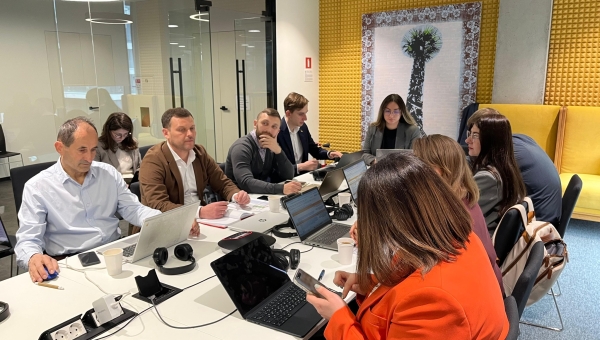
- Country: Ukraine
- Component: Other
Ukrainian institutions received targeted support from the EU4Green Recovery East to prepare for one of the most crucial phases of EU accession: the bilateral screening of the current state of transposition of the EU acquis, and here in particular on Chapter 27 – the EU acquis on Environment and Climate Change.
What Is Bilateral Screening and Why Does It Matter?
As part of the EU accession process, candidate countries undergo a bilateral screening to assess how closely their national laws and institutions align with the EU acquis ahead of accession negotiations. The EU acquis is the body of existing EU legislation and standards. For Chapter 27, the environment chapter, this means demonstrating the state of current alignment with over 200 pieces of environmental and climate legislation.
To prepare for this critical step, three rounds of mock screening sessions were held between April and June 2025. These simulations replicated the structure of the actual EU screening, providing Ukrainian representatives and experts the opportunity to reflect on their state of preparations. The mock sessions allowed for receiving expert feedback in a safe environment, and for fine-tuning their institutional readiness.
A Strong Team Europe Approach
The final mock session exercise took place on 10 June 2025 in Kyiv (in hybrid form), concluding a three-part process that began in April and intensified in May. The initiative was marked by a strong Team Europe spirit, bringing together over 40 experts from seven countries, including EU Member States (Austria, Finland, Lithuania, Sweden), representatives from the Western Balkans, international organisations and independent advisors.
Together, they supported Ukraine’s technical teams in structuring presentations according to EU standards, identifying legal and institutional gaps, and offering practical recommendations for the next phase of reforms.
As one participant remarked, “This was more than a technical rehearsal—it showed what’s possible when coordination, expertise, and shared goals come together.”
Results and Lessons Learned
The simulations provided valuable insights into Ukraine’s level of preparedness, actionable feedback for improving legislative alignment, as well as confidence and structure for the official bilateral screening, which was held 16–20 June 2025.
Part of a Broader EU Commitment
This preparatory exercise was supported by the EU4Green Recovery East programme under a component dedicated to supporting alignment with the EU environmental acquis and led by the Environment Agency Austria. The programme, funded by the European Union, is meant to advance environmental reforms and green growth across the Eastern Partnership countries.
By supporting Ukraine and other partner countries in their preparations for EU integration, the EU4Green Recovery East programme contributes to a greener, more resilient future in line with the EU Green Deal.
Credit picture: Ministry of Environmental Protection and Natural Resources of Ukraine
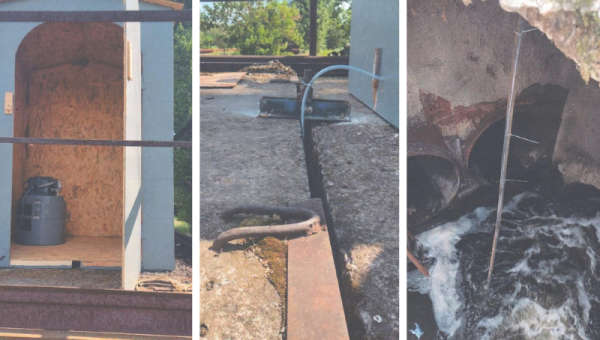
- Country: Ukraine
- Component: Water resources
Two state-of-the-art autosamplers are now operating at the Wastewater Treatment Plant in Kryvyi Rih, Ukraine, strengthening the country's capacity to monitor wastewater for public health and treatment performance.
The equipment, donated by the City of Vienna (Wien Kanal), automatically collects water samples every five minutes over a 24-hour cycle. One sampler is placed at the inlet—before wastewater is treated—to monitor public health risks, such as the presence of pathogens like COVID-19 or typhus, and can also indicate high levels of pharmaceuticals or substances related to drugs. The second sampler is positioned at the outlet, helping assess the effectiveness of the wastewater treatment process.
This automated system provides a much more comprehensive and reliable data set than manual sampling, while also reducing the workload for on-site staff.
The donation was made possible through cooperation under the EU4Environment Water and Data programme, funded by the European Union. Austrian and Ukrainian experts, working together through the programme, identified the equipment need and helped secure additional support. The City of Vienna stepped in with the donation and the UNEP office in Kyiv facilitated the transport from Vienna—showcasing a strong Team Europe approach, where EU funding mobilises further contributions from EU Member States to benefit Eastern Partnership countries.
Credit picture: Krivbasvodokanal

- Country: Ukraine
- Component: Water resources
We are pleased to inform that factsheets on the nine Ukrainian River Basin Management Plans are now available in both Ukrainian and English!
From this link, you can download the summary factsheets providing key data and illustrative figures on the state of surface water and groundwater in Ukraine, as well as the programmes of measures to improve them.
The RBMPs have been approved by the Cabinet of Ministers of Ukraine between 1 November and 31 December 2024.
Read our article to know more.
These factsheets, as well as the full RBMPs document, have been developed with the support of the European Union.
All RBMPs documents are available on the website of the Ministry of Ecology and Natural Resources of Ukraine: https://mepr.gov.ua/diyalnist/napryamky/stale-upravlinnya-vodnymy-resursamy/plany-upravlinnya-richkovymy-basejnamy/
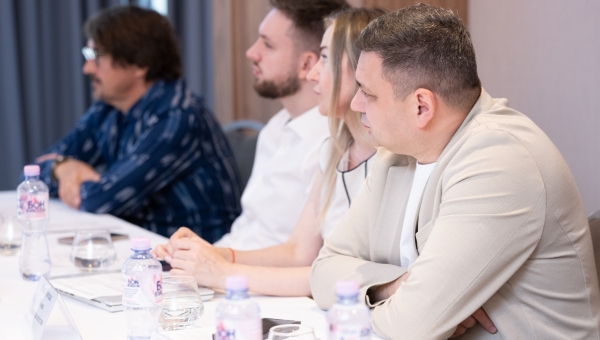
- Country: Ukraine
- Component: Water resources
On Danube Day, Ukrainian authorities assess progress on water management with the support of EU-funded programmes
To mark International Danube Day 2025, Ukrainian water authorities gathered in Odesa to take stock of their efforts in implementing River Basin Management Plans (RBMPs)—a key tool for improving water quality and climate resilience. The event, supported by the EU-funded EU4Green Recovery East programme, brought together river basin administrators, government representatives, and stakeholders from across Ukraine.
Danube Day is celebrated annually on 29 June under the auspices of the International Commission for the Protection of the Danube River (ICPDR). Festivities are organised in each of the 19 countries that lie within the Danube basin.
In Odesa, various speakers presented a wide range of measures to be implemented with priority in Ukraine, focusing mainly on water supply and sanitation, as well as river restoration and citizens engagement. These measures will be implemented based on innovative approaches applied internationally , such as nature-based solutions, and with practical exchange of experiences among basin managers.
Commitment to Basin Cooperation
The heads of the river basin administrations and basin councils from the three Danube sub-basins, the Tisza, Prut-Siret and Lower Danube jointly signed a Declaration on Cooperation in Odesa and committed themselves to partner towards achieving or maintaining the "good" ecological and chemical status of surface and groundwater bodies.
RBMPs, developed with EU support under the previous EU4Environment – Water and Environmental Data programme, are now being put into action. For the first quarter of 2025, Ukrainian basin authorities report that 6% of RBMP measures have already started (nearly 100 measures), with some 20% already included in planning documents. While much of the work remains ahead, the process of implementation is clearly underway.
Improving water quality as a national priority
More than 70% of the planned measures relate to wastewater treatment and sanitation, addressing one of the most pressing challenges for Ukrainian rivers. As part of this effort, a State Targeted Environmental Programme to support the modernisation of wastewater infrastructure was presented during the meeting. This national initiative aims to accelerate upgrades of outdated water infrastructure by aligning investment priorities with the RBMPs.
"Despite the challenges of wartime, Ukraine is taking its first concrete steps towards implementing the basin management plans," said Igor Gopchak, the Head of the State Agency of Water Resources of Ukraine. "We now need to maintain strong cooperation with local authorities and ensure financing for future phases."
Transboundary cooperation, from the Danube to the Black Sea
The event also highlighted the importance of cross-border cooperation, notably with Moldova and Romania on the Prut River, an important tributary on the lower Danube. EU support under EU4Environment and now EU4Green Recovery East has helped formalise this cooperation, with a trilateral Memorandum of Understanding signed in 2023 and a related Prut Working Group established under the ICPDR in 2024.
Ukraine is home to four transboundary Danube tributaries: the Prut, the Tisza, the Siret and the Lower Danube. Consequently, Ukraine collaborates closely with Hungary and Slovakia on the Tisza sub-basin and with Romania on the Siret and Lower Danube. These partnerships are vital for addressing issues such as floods and cross-border pollution.This collaboration reinforces the goals of the new EU Black Sea Region Strategy, which aims to develop a stable and secure Black Sea region and reduce pollution flowing from rivers into the sea.
The event conveyed how Ukraine is advancing shared environmental goals through regional dialogue, coordinated planning, and joint actions — demonstrating resilience and commitment to sustainable water management even in the face of the ongoing Russian war of aggression. The EU will continue supporting Ukraine’s efforts in this direction through targeted technical assistance and regional cooperation.
Press release from the State Agency of Water Resources of Ukraine (in Ukrainian): https://www.davr.gov.ua/news/koordinuyemo-dii-ta-plani-pershij-oglyad-realizacii-purb
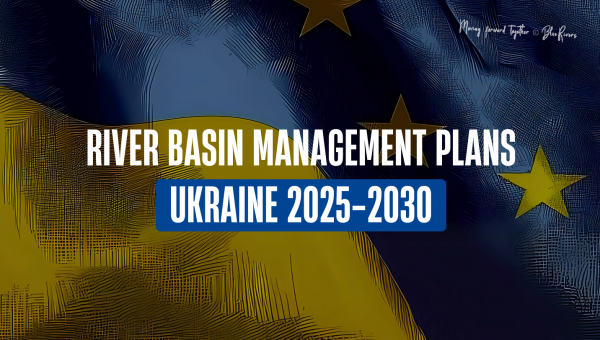
- Country: Ukraine
- Component: Water resources
Ukraine has officially adopted eight River Basin Management Plans (RBMPs), marking an important milestone in its journey towards sustainable water management in line with European Union (EU) and international standards. Supported by the EU4Environment - Water Resources and Environmental Data programme, the plans outline strategies and actions to protect and manage the country’s river basins.
Adoption of Eight River Basin Management Plans
On November 1st 2024, Ukraine's Cabinet of Ministers approved eight RBMPs covering the Dniester, Dnipro, Don, Southern Bug, Black Sea, Azov Sea, Vistula, and Crimean river basins. With the Danube basin plan still to be adopted, the nine plans cover more than 600,000 km² (about the size of France) and will provide benefit some 40 million Ukrainians. The 9 plans include programmes of measures to reduce local pollution and improve deteriorated riverbeds with an estimated investment need of €7.7 billion* (€7.3 billion for the 8 adopted RBMPs), or €32 per inhabitant per year (over 6 years). 70% of these measures focus primarily on sanitation.
*The EUR/UAH rate is from June 2024 and the calculations of the cost of measures were carried out during 2016-2023.
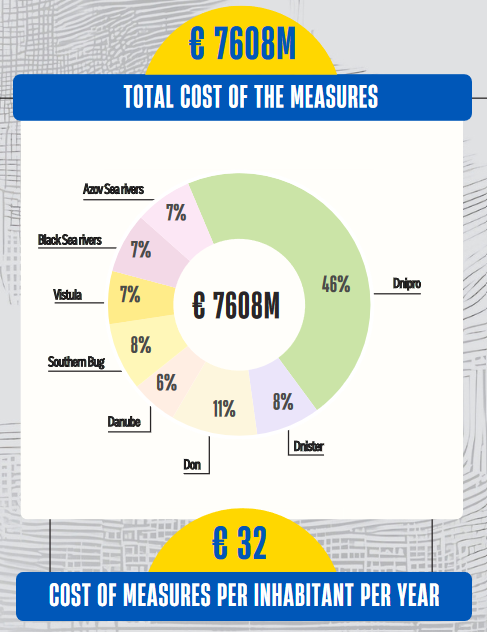
Credit: Blue Rivers Ukraine.
The preparation of these complex and extensive RBMP documents, each of which runs to several hundred pages and contains thousands of facts and figures, is all the more remarkable when one considers the very scattered sources of information in Ukraine and the particularly difficult working conditions during the Russian war of aggression.
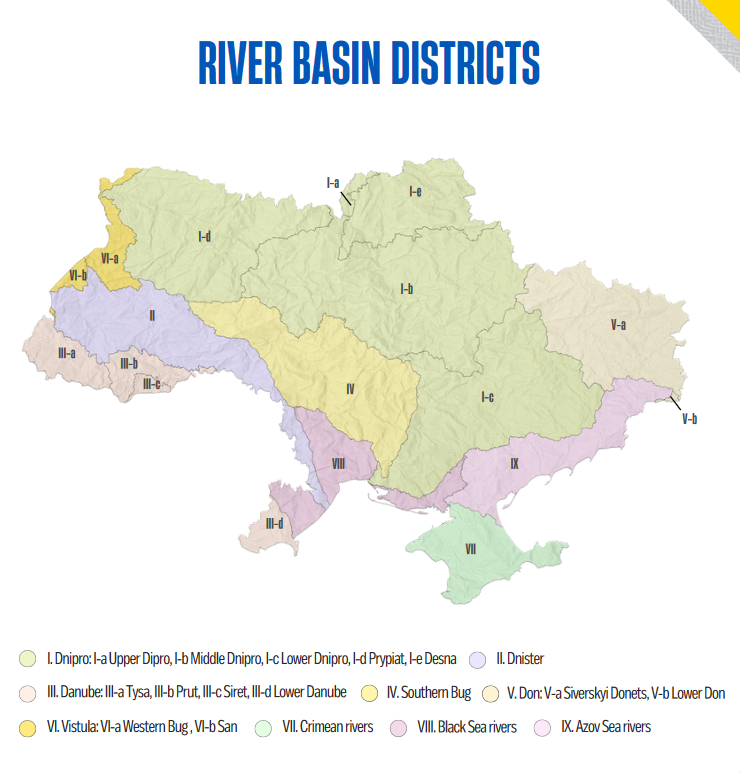
Credit: Blue Rivers Ukraine.
The RBMPs are designed to address key water management issues such as wastewater from cities and industries, water abstraction from agriculture, and water ecosystem health, putting Ukraine on a path to align with the EU Water Framework Directive (WFD). In particular, the Dnipro basin — the largest river basin in Ukraine and one of the largest in Europe — serves as a model for the implementation of sustainable water management practices throughout the country.
EU Support for RBMPs Development
The plans were developed by Ukrainian experts with guidance and financial support from the European Union through the EU Water Initiative + (2016-2020) and the EU4Environment - Water and Environmental Data programme (2021-2024). They reflect a basin-wide approach, focusing on all surface and groundwater systems rather than on individual water user sectors. The plans promote better protection of water resources, equitable distribution of water and sustainable management practices. Public consultations from December 2023 to June 2024 ensured that local voices and stakeholder input were included in the final drafts.
While the data currently available on the status of water bodies are not comprehensive for the whole country, but only available for a few localised areas, future monitoring programmes must provide much needed knowledge. Such limitations also existed in some river basins of EU Member States, when their first RBMPs were drafted 20 years ago. Improving Ukraine’s capacity in water data sampling and analysis is another task of the ongoing EU support. It is expected that future RBMP updates will benefit from improved water monitoring, which will allow for testing and verification of improvements or deteriorations in environmental and chemical status, and consequently the design of even more targeted measures.
Background on Ukraine’s Water Challenges and EU Integration
As the largest country in Europe, Ukraine faces various water challenges in its different regions. While the Carpathian region is rich in water, freshwater resources are limited, especially in the dry steppe landscapes of the south and east.
Aligning its water management policies with EU standards has been a priority for Ukraine since signing the EU Association Agreement in 2017. In 2022, Ukraine’s EU candidate status further reinforced the need for environmental reforms, and in December 2023, the European Council decided to open EU accession negotiations with Ukraine, recognising the progress made.
This achievement underlines Ukraine’s resilience and commitment to environmental sustainability, even in challenging times, in the face of Russia’s war of aggression and its severe impact on water resources and water infrastructure, such as the destruction of the Kakhovka reservoir. Currently, two River Basin Districts are fully occupied (Crimean rivers and Azov Sea rivers) and three are partially occupied (Don, Dnipro and Black Sea rivers).
The adoption of these RBMPs brings Ukraine one step closer to meeting EU standards for water management, ensuring a greener and more sustainable future.
*The EUR/UAH rate is from June 2024 and the calculations of the cost of measures were carried out during 2016-2023.


